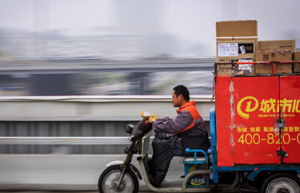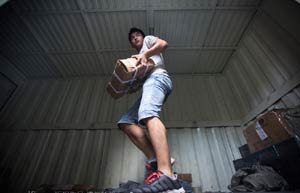Online shopping soars, delivery service booms
(Xinhua) Updated: 2014-11-08 11:53"Things are getting quite hectic these days," said Leng Hongbo, a staff member at a Yunda subsidiary in Changping District, Beijing.
Leng said they are processing about 6,000 parcels on an average day, while expecting the number to soar in the next few days. His branch has also recruited new staff prior to the country's largest online shopping day.
"I have confidence in the industry," Leng said, "because China has such a huge market demand and the Internet population is constantly growing."
 |
|
 |
While there's a current boon in the delivery business, contention with government policies and cases involving delivery of prohibited products may become stumbling blocks that hamper the sector's development.
China's couriers typically ride electric tricycles, which are banned in certain city areas because of posing potential traffic hazards. This often results in couriers being detained and their tricycles seized.
Hao Fangming, who delivers for Guangdong-based Sure Express, said he lacks a sense of belonging in society because of the job. Six of Hao's tricycles have been confiscated so far this year.
"I feel like a thief because the police always try to detain me," Hao told Xinhua.
Some companies have asked their staff to use bicycles, but that has greatly slashed efficiency.
Jiang Chaofeng, head of the China Material Storage and Transportation Association, said logistics companies are not liked by local governments, as they supply limited tax and cause traffic congestion.
The situation has angered many working for express companies. A courier told Xinhua that he refuses to deliver any packages to traffic departments because he "may not be able to leave after the delivery."
Another hurdle is the problem of shipping forbidden products such as knives, ammunition, flammable materials, chemical products or terror-related items. Similar cases have been reported, raising wide concern about the management of China's express industry.
In January, police in Shandong province confirmed that methyl fluoroacetate was the culprit in the case of a toxic express courier package that left one man dead and seven others sick in 2013.
Industry insiders blame the loopholes on patchy enforcement of law and lax supervision.
"The government needs to intensify supervision efforts and help companies improve management to ensure safety," Li of the China Express Association said.
- Cash crunch fans expectation on RRR cut
- US extends antidumping duties on China's thermal paper
- Modern food van with ancient look in Shanghai
- China home prices continue to cool in November
- Asia's top 3 billionaires all Chinese
- Old investment remedy the treatment for China's "new normal"
- China's solar sector opposes US anti-dumping ruling
- BMW to recall 846 cars in China
















